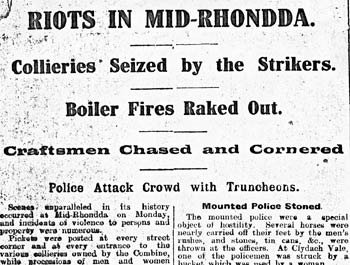Hundreds hurt as police clash with striking miners. Helen Morgan from Abergavenny Local History Society reports

Soldiers guarding the Pandy pits
Few people outside of Wales would have heard of Tonypandy before 1910. But it was known across the world after the bloodshed and violence on November 7 and 8 made front-page headlines.
Two months earlier, owners at Ely Pit in Penygraig had locked out 950 miners when a pay dispute hit deadlock with accusations that miners at a difficult seam were deliberately working slowly. By November 2, a pay offer of 2s 3d per ton, negotiated by “Mabon”, the Liberal MP William Abraham, was rejected. The strike then spread to other pits in the Cambrian Combine — a cartel that fixed coal prices and wages.
Glamorgan Constabulary began to make contingencies for when the pit owners tried to bring in “blacklegs” to maintain the only functioning pit in Llwynypia. Despite initial reservations, Winston Churchill, then Home Secretary, eventually heeded calls from the pit owners and sent 200 Metropolitan Police officers to Tonypandy, with the Lancashire Fusiliers held in reserve in Cardiff.

A newspaper headline from the time
On November 7, picketers and strike-breakers clashed at Llwynypia. Colliers and police fought hand-to-hand as strikers pelted the pit’s powerhouse with rocks. The battle lasted for two hours during which time one miner was killed and 300 police batons were broken or lost. Eventually mounted police beat the miners back, sparking two nights of rioting and looting.
Chief Constable Lionel Lindsay then called in the troops from Cardiff. Despite the controversy their intervention caused, they did not actually arrive in Tonypandy until after the rioting had begun to subside. Indeed, throughout their four months in the Rhondda, relations between the soldiers and miners seem to have been extraordinarily cordial given the circumstances, says David Maddox, whose talk about the Tonypandy Riots is at the Borough Theatre this month. “You have to remember that the story of the riots has been handed down from generation to generation, and has altered subtly over the years. Research has unearthed sources demonstrating that it was the decision to call in the troops which made the miners so bitter; not their actual presence.” The troops were seemingly popular with the girls — it was said that every Lancashire Fusilier could sing at least two verses of Cwm Rhondda by the time they left.
Skirmishes continued until August 1911, when the miners were forced to accept the original offer of 2s 3d per ton, and return to work.
David Maddox’s talk on the Tonypandy Riots on October 18 at the Borough Theatre starts at 7.30pm.
Non-members are welcome to join on the night.

